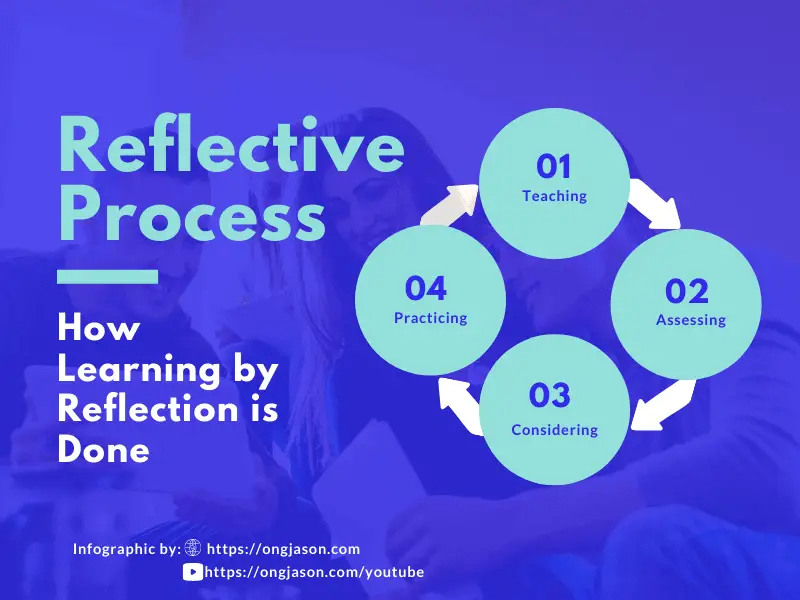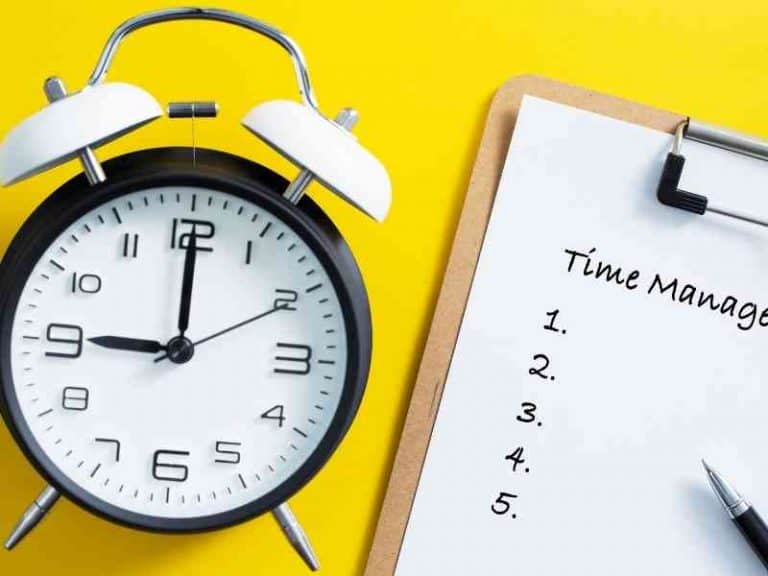How does reflection improve learning?
As I am reflecting on my journal, I got to thinking about how reflection helped me improve. This includes being more efficient in learning and finding out the things I need to learn. But does reflection really helps in learning? How does it help? To know the answer, I decided to check multiple scientific journals.
Reflection improves learning because it helps people have a thorough understanding of what they have learned, how far they’ve achieved, and their study approach. This helps them in choosing what actions need to be taken which helps in the learning process.
In this blog post, I have 7 reasons how reflection or self-reflection improves our learning. We are going to learn not just from my experience, but also what scientific journals say about the topic. We would also introduce the reflective process which is now being used by various learning institutions to boost learning.

1. Reflection helps us in assessing our learnings
Reflection is an important part of learning because it helps us a proper assessment of our learning skills and knowledge. It helps students know if their study techniques are efficient enough or their current knowledge is enough to pass the exams.
Perhaps the most important and obvious reason why reflection improves our learning is that it helps us have a proper assessment of our skills.
For example, we can get an assessment on how much time we give to studying or if we are studying efficiently.
That is because we are quite different from each other and our effective methods of learning will be different from one another.
For example, I am a morning lark so you can’t expect me to learn fast at night or to pull an all-nighter.
If you’re a night owl, then it will be better for you to learn at night.
Another example is that I prefer learning all by myself or should I say I prefer people not seeing me study, while others prefer staying with their peers.
As you can see, our techniques on how we’ll study effectively are different from one another. That’s why we need a proper assessment or to reflect on what works for us.
That’s one of the main reasons why reflection is important in our learning whether at school or experience.
Remember that only you can find out what is the best learning method for you and that involved self-reflection.
If you need help on what learning techniques to assess, I made an article explaining multiple ways you can learn effectively. I believe that you’ll find some ideas there that would work for you. Here is the article: How to be a hardworking student
If you’re more on the visual side, here is a YouTube video of me teaching the study techniques that helped me graduate with honors.
2. Reflections gets our priorities straight
One reason why reflection improves our learning is that it gets our priorities straight.
What I mean by that is we can start assessing if what we are doing is right or wrong depending on our priority.
For example, if your priority is to pass the exams tomorrow, then it is a bad idea to just hang out today. If you have limited time, then it is not a good idea to lay in bed and open your social media accounts.
To prevent this from happening, we need to do some reflections.
Daily reflections get us on point on our goals.
We can constantly ask if what we are doing is inline or not in line with our goals.
We all have 24 hours in a single day and how we use that limited time is what sets us apart from others.
Since we only have limited time and energy, we need to know exactly what are the things that would be beneficial for us.
In short, getting our priorities straight helps us cope with procrastination.
3. Reflection makes us responsible for ourselves and things we learn
I mentioned earlier the importance of managing your limited time and energy to do what’s needed.
That’s getting priorities straight.
Now, let’s talk about responsibility.
It is your responsibility to choose studying overplaying especially if exams are near.
In a research paper published in Organizational Dynamics, it was found out that reflection is important because it keeps managers responsible for their own learning.[1]
Being completely responsible for your own self is important in achieving things in life.
This is also true with learning.
If we reflect and see flaws in our current learning techniques, then it is the perfect time for us to accept this fact and improve upon it.
That’s the power of owning or being responsible for your own skills is important if we want to be better.
That includes our desire to learn.
For example, if I didn’t become responsible for my own career, I won’t even bother creating more YouTube videos to learn.
That’s because we learn more by doing.
What some people miss is that learning is not all about reading a book and going to school. Learning can also be done through doing.
And reflection is important in that process.
But it’s also true in school situations.
We can assess and ask ourselves if we have done our goal for today or not. Have we read enough pages? Did we listen properly to our teachers?
We can grasp our current situation with reflection.
Here is one of my first videos. In the video, I explained the importance of being responsible for yourself.
4. Reflection keeps us on track
Self-reflection keeps us on track.
It helps us think straight about what we need to do to achieve our study goals.
What specific chapters do we need to study to pass the exam? What skills do I need to develop to pass the practicals?
To answer that, we need to reflect on our current knowledge on skillsets.
We need to be sure of where we want to be. We need to be sure that what we are learning is the important ones.
That’s why reflection helps us in learning.
In a study from Nurse Education Today, it was found out that nursing students who do self-reflection are found to be more competent than the others.[2]
In fact, they have seen a 39.4% increase in the student’s competency.
That’s a big number.
And competent students are the ones who usually get higher grades.
Lastly, they also found that students who do self-reflection have less stress.
5. Reflection helps reduce stress
In the same study from Nurse Education Today, it was found out that students who practice self-reflection are less stressed overall leading to better grades and increased competence.
It is no wonder that’s true.
Since they know what they need to do to pass their exams, they will be less stressed since they have a clear target.
What makes people stressed out is usually unpredictability.
For example, if what’s coming out of exams is extremely unpredictable, that would make them guess a lot which would be of use and which isn’t.
Being clear with your goals and reflecting on what study techniques work is essential to reduce or even remove this uncertainty.
Furthermore, stress does nothing since it prevents our brains from learning.
A study from the Neurobiology of Learning and Memory found out that stress impairs memory formation.[3]
Thus, stress makes people learn less.
This is also a good reason why reflection improves learning.

6. Reflection is a proven learning process
Reflection is important in learning because it is already a proven model.
Numerous scientific journals already produced the exact reflection curve in order to learn better.
In fact, multiple scientific research papers already reported the benefits of reflection to learning.
And if you want to really reflect, I made a simple infographic on the reflection loop.
Here are the 4 steps reflective process.
- Teaching – Teaching the topic
- Assessing – Assessing the learnings
- Considering – Considering or Trying new ways to learn
- Practicing – Practicing the things learned
Teaching introduces the topic. Assessing helps us know which needs improvement. Considering helps us handle things that need improvement, and practicing helps us solidify the information.
If you need help on how to assess, I have a guide on self-reflection that can help. Here is the link: How to Develop a Self-reflection Practice
7. Reflection helps Teachers Teach Better
In a book published in 2002, it was found out that professors who are exemplary or good at teaching do self-reflection.
They researched 6 professors who are good at teaching and found out that they held and used considerable knowledge about their students by reflecting. [3]
This means that they started adjusted their teaching strategy by reflecting on how their students learn. Thus, making them known in their various universities as the best professors.
This is especially true if you think about it.
When I was a new lecturer, I also did the same.
After each lecture, I tried a lot of teaching techniques and found out what works and what doesn’t.
It helped me become a better lecturer.
I didn’t just question my teaching techniques, I also tried to learn more about each topic and to see if I am now confident enough to teach.
This helped me reach a national level of lecturer before I got into blogging.
Thus, self-reflection not only helps students learn but also helps teachers teach which helps both sides of the learning process.

“Only the things I love.“
ongjason.com is reader-supported. When you buy through links on the site, I earn an affiliate commission.
If you’re following me, you’ll know that I believe it is essential to have some tools, whether it’s for personal development or lifestyle in general.
So, here are the things I love.
YouTube
If you want to learn things for free, I recommend watching my YouTube Channel. Click the Button Below to go straight into my Channel. 🙂
Okay, let me first explain my Channel.
I believe that I really can’t explain everything too well on my blog. That’s why I created a YouTube Channel so I can easily explain a lot of things. Plus, I believe that Video Sharing is the future.
Recommended Books
The next thing is books. Books are, for me, one of the cheapest ways to get invaluable information. We can learn personal development, finance, career, relationships, and many more from books.
Here, I will be listing my favorite books in different categories.
- For Beginners – 7 Habits of Highly Effective People by Stephen Covey – Personal development has a lot of concepts and ideas to learn. Thus it can be really hard for beginners to know where to start. Thus, I recommend this book since all the basic concepts of personal development are here(except finance, check what I recommended for that)
- Productivity – The One Thing by Gary Keller – This book teaches us the power of focusing on one thing which is the ultimate source of productivity. The concepts taught are what I am using to constantly publish YouTube videos while maintaining this website.
- Busy? – Make Time by Jack Knapp – This book teaches us how to make time for the things we love. The concept is really simple but I think that makes it a book worth reading.
- Health – Lifespan by Dr.Sinclair – This Book teaches about the latest scientific research on lifespan. In his book, he has shared numerous things he is doing to slow down his aging process. This can be as easy as eating less which he recommends.
- Finance – The Richest Man in Babylon by George Clason – Perhaps one of the first books I’ve read about Finance, this book for me is the best if we are talking about learning basic finance such as basic saving and investing. The concepts are very simple but effective.
Audiobooks
Take this advice as a grain of salt.
I don’t recommend buying Audiobooks one by one. I mean, audiobooks can be quickly finished by listening while working out or doing some mindless tasks.
So here is to save you some money. Just go for a monthly subscription to Audible. I believe that you will save a lot of money with that plus, they usually give freebies to anyone starting.
My Audiobook Recommendation will always be the same as my book recommendations, but I personally like The 5 Second Rule by Mel Robbins. I like how she is so casual while reading her book.
Source:
- Wood Daudelin, Marilyn. “Learning from Experience through Reflection.” Organizational Dynamics, vol. 24, no. 3, 1996, pp. 36–48. Crossref, doi:10.1016/s0090-2616(96)90004-2.
- Eng, Cheng-Joo, and Hsiang-Chu Pai. “Determinants of Nursing Competence of Nursing Students in Taiwan: The Role of Self-Reflection and Insight.” Nurse Education Today, vol. 35, no. 3, 2015, pp. 450–55. Crossref, doi:10.1016/j.nedt.2014.11.021.
- Schwabe, Lars, and Oliver T. Wolf. “Learning under Stress Impairs Memory Formation.” Neurobiology of Learning and Memory, vol. 93, no. 2, 2010, pp. 183–88. Crossref, doi:10.1016/j.nlm.2009.09.009.
- McAlpine L., Weston C. (2002) Reflection: Issues Related to Improving Professors’ Teaching and Students’ Learning. In: Hativa N., Goodyear P. (eds) Teacher Thinking, Beliefs and Knowledge in Higher Education. Springer, Dordrecht. https://doi.org/10.1007/978-94-010-0593-7_4






